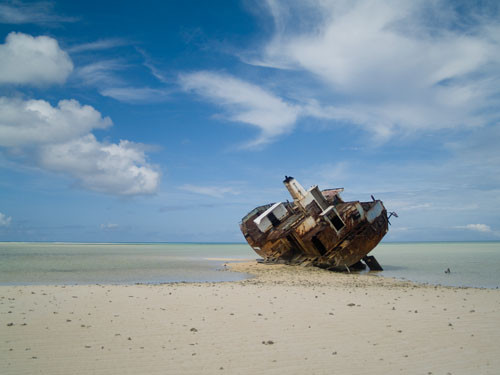Julieta Aranda
28 May - 11 Jul 2010
JULIETA ARANDA
"If you tell the story well, it will not have been a comedy"
28 May - 11 July 2010
Opening: 28 May, Friday, 7 pm
In 1995, Kiribati -- a small archipelago nation in the South Pacific uncomfortably straddling the International Date Line -- decided to bend the line's course by 2000 miles so that the entire country could live in the same time zone rather than be split between "yesterday" and "tomorrow". Fascinated by the idea of experiencing this time paradox first-hand, Julieta Aranda visited the islands in 2008 expecting to arrive to a tropical paradise of beautiful beaches and sunsets. What she found instead on Kiribati was a kind of historical freeze-frame: the site of major WWII battles no one bothered to clean up, the debris of which gave the effect of a moment frozen in an uncannily cinematic landscape: where Fitzcarraldo meets Apocalypse Now. A much greater temporal paradox than Aranda could have imagined, Kiribati produces a sense of history that is purely immanent -- a past that has not been historicized because it has not been consumed, one that appears both completely detached from its own occurrence, yet absolutely immediate and available as experience.
For the exhibition at Kunstverein Arnsberg, Aranda will present photographs, a film and a sculpture developed following her trip to Kiribati.
Julieta Aranda was born in Mexico City and is currently based in Berlin and New York. Aranda's work has been exhibited internationally in venues such as Solomon Guggenheim Museum (2009), where she was the first artist doing a solo presentation for the "Intervals" exhibition series; New Museum of Contemporary Art in NY (2010), MOCA Miami (2009), Witte de With, (2010), Museum of Contemporary Art in Chicago (2007), 2nd Moscow Biennial (2007) MUSAC, Spain (2006), and VII Havana Biennial; amongst others.
"If you tell the story well, it will not have been a comedy"
28 May - 11 July 2010
Opening: 28 May, Friday, 7 pm
In 1995, Kiribati -- a small archipelago nation in the South Pacific uncomfortably straddling the International Date Line -- decided to bend the line's course by 2000 miles so that the entire country could live in the same time zone rather than be split between "yesterday" and "tomorrow". Fascinated by the idea of experiencing this time paradox first-hand, Julieta Aranda visited the islands in 2008 expecting to arrive to a tropical paradise of beautiful beaches and sunsets. What she found instead on Kiribati was a kind of historical freeze-frame: the site of major WWII battles no one bothered to clean up, the debris of which gave the effect of a moment frozen in an uncannily cinematic landscape: where Fitzcarraldo meets Apocalypse Now. A much greater temporal paradox than Aranda could have imagined, Kiribati produces a sense of history that is purely immanent -- a past that has not been historicized because it has not been consumed, one that appears both completely detached from its own occurrence, yet absolutely immediate and available as experience.
For the exhibition at Kunstverein Arnsberg, Aranda will present photographs, a film and a sculpture developed following her trip to Kiribati.
Julieta Aranda was born in Mexico City and is currently based in Berlin and New York. Aranda's work has been exhibited internationally in venues such as Solomon Guggenheim Museum (2009), where she was the first artist doing a solo presentation for the "Intervals" exhibition series; New Museum of Contemporary Art in NY (2010), MOCA Miami (2009), Witte de With, (2010), Museum of Contemporary Art in Chicago (2007), 2nd Moscow Biennial (2007) MUSAC, Spain (2006), and VII Havana Biennial; amongst others.

